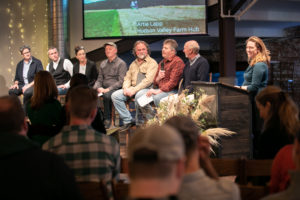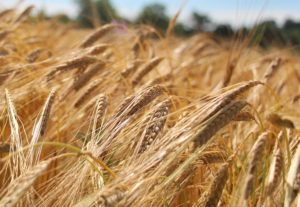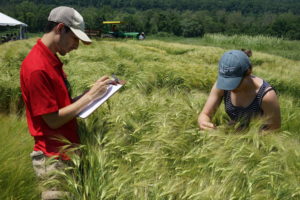Lessons learned from small grains trial
The Hudson Valley Farm Hub recently marked five years of extensive research on small grain varieties at the farm, with the goal of sharing knowledge with area farmers, and promoting the small grains economy.
Since 2013, the Farm Hub has partnered with Cornell University and Cornell Cooperative Extension of Ulster County to gather data on a variety of grains and share their findings with area farmers interested in adding grains into their rotations and moving into the local grains market. Most recently the trials were spotlighted in a short documentary “Growing with the Grain” produced by filmmaker Jon Bowermaster of Oceans 8 Films. The film screened to a Senate Garage in Kingston.
The small grains project goes back to 2013, when the staff of the Local Economies Project and Hudson Valley Farm Hub and Cornell University started discussing ways they could work together and support the revitalization of local grains.
“The region has lost so much of the knowledge and experience of working with grains that we need to provide reliable research to gain an understanding of what grows well here, especially using organic methods,” says Sarah Brannen programming director at the Farm Hub who led the project. “When we started this research project there were very few farmers growing small grains in the Hudson Valley at any scale. It seemed like a missed opportunity because grains are vital to sustainable, diversified farming and are in great demand.”
For the project, over 100 varieties of spring and winter wheat, barley, rye, and oats were planted in small plots over five growing seasons and 12 select varieties were trialed in large plots over three growing seasons. After each harvest, the Farm Hub stores the grain and sends it out to regional processing partners to mill, bake, malt, brew, and distill the test varieties to determine their usability and flavor profiles.
“Five years ago, we set out to determine whether small grains can be grown in the Hudson Valley and whether they can be grown organically. We now know, yes, they can. There are a number of promising varieties we’ve identified. Perhaps the greatest accomplishment over the past five years is the collaborative effort to learn from each other—farmers, researchers, agricultural educators, and local businesses and artisans,” says Brannen. “It takes that type of local partnership to build trust and communication before the food system can change.”
Key lessons uncovered to date are:
- Many varieties of wheat, barley, rye, and oats can be grown in the Hudson Valley to reliably good result and have the qualities end users are seeking.
- Organic methods can produce the same or better results than conventional methods for grain yield and disease resistance.
- Limited seed availability of newer or non-commercial varieties can present a challenge to growing larger quantities of some desirable varieties.
- Grain growing is a capital-intensive endeavor due to the various types of equipment required for planting, cultivation, harvesting, drying, and cleaning.
- Adequate storage is of the utmost importance in maintaining grain quality, but remains an issue for many local growers and artisans.
- Revitalizing the local grain value chain will require ongoing variety trials, experimentation, and collaboration.

Weather patterns can also have a significant impact on the research trials. Results of the trials can vary dramatically from season to season, as conditions can pendulum from extremes of wet to dry. It appears the Hudson Valley region will be seeing an uptick in rain from the effects of climate change, says Brannen.
“The knowledge gathered from these variety trials is therefore highly valuable to gauge what grows well given a particular set of conditions,” Brannen says. The research on grain varieties is publicly available via Cornell Cooperative Extension for existing and new farmers seeking to grow small grains to review.
As part of the project, local businesses including millers, maltsters, brewers and distillers, with the grains for processing trials. Bread Alone, Dennings Point Distillery, From the Ground Brewery, Wild Hive Farm, Hudson Valley Malt, Keegan Ales, Our Daily Bread and Union Grove Distillery were participants.
The October film screening “was a really good opportunity to celebrate how far we’ve come in five years and to begin to talk about the pivot toward the future,” says Brannen. The event featured speakers including from GrowNYC, a short film about the project, and taste tests with products that the Farm Hub’s partners have made using grain grown at the Farm Hub.
The Hudson Valley stands out from many regions in the state because of its demand for hard wheat for baking bread, coupled with a burgeoning consumer market for local grains, said Mark Sorrells, a professor of plant breeding at Cornell University, who worked on the trials. Sorrells marveled at the pastry Bread Alone, a local bakery, produced from Medina one of the grains trialed and pointed to the `grow local, buy local’ trend in the region.
“What’s really surprising is when you shift from commodity production to local products you can experience local ingredients. I think consumers really find that quite interesting, seems like the interest in local foods and products continues to grow,” said Sorrells. “One of the surprising benefits of identifying and testing grains in the Hudson Valley is that it contributes to the feasibility of producing local food products.” The Farm Hub will continue to work with Cornell on small plot variety trials in 2019. A goal of the project is to focus more on baking varieties, and include buckwheat, which is a gluten-free variety used for baking.
Grains also play a practical role when it comes to farming such as combating disease in soil, said Jay Goldmark, the Farm Hub’s field crops production manager. Certain grains such as wheat offer value in crop rotation giving the ground a rest from other crops, helping foster the growth of other crops and also providing good shading. Grains such as oats, barley and wheat can be “great nurse crops,” Goldmark said.
Brannen expects that this project will exist in some form at the Farm Hub for a long time.
My hope is that we can continue to test varieties, but also raise more awareness about small grains in the broader community and learn more about the social and cultural history of grains in the region to have a full picture of their significance,” she says. “I’m sure grains are always going to be part of what the Farm Hub grows given their value in diversified agriculture.”
–Amy Wu
To read more about the results from the small grains research trial, go to the Cornell Cooperative website.
Click here to watch the short film “Growing with the Grain” that tells the story of the small grains research at the Farm Hub.


